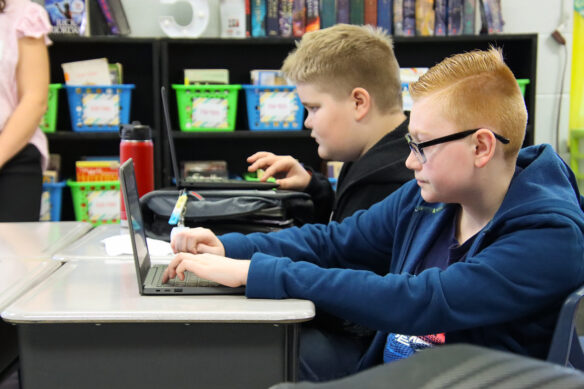
The Kentucky Department of Education (KDE) has been helping districts with digital learning coaches, spending $3.2 million dollars of funding from the Elementary and Secondary School Emergency Relief (ESSER) fund to either help districts hire digital learning coaches or supplement what they have already been doing.
Photo by Joe Ragusa, Kentucky Department of Education, Dec. 12, 2023
Starting a new job as a digital learning coach for the Murray Independent school district in January 2020, Mechelle Morgan said she was just looking to build off what her predecessors had already accomplished in terms of integrating technology into the classroom.
“And then obviously the pandemic hit in in March,” she said. “So that kind of evolved and changed the way we had to do some things.”
Morgan said the district had to act fast to make sure students and families were adequately prepared for the new landscape of digital learning, helping them become familiar with the devices they were using while still maintaining a quality education overall.
“There was a lot of helping teachers and students and families learn how to use the technology that they needed and to quickly do those kind of things,” said Morgan. “And so that was kind of a big part of during the pandemic; making sure that our students were still getting every service that they needed and had access to the technology that they needed.”
The Kentucky Department of Education (KDE) has been helping districts with digital learning coaches, spending $3.2 million of funding from the Elementary and Secondary School Emergency Relief (ESSER) fund to either help districts hire digital learning coaches or supplement what they have already been doing.
Whitney York, assistant superintendent for Murray Independent, said the funding has helped Murray Independent make Morgan’s role more robust.
“The job at one point was the same contract as a teacher, and so now she’s able to have some extended days to work and do training in the summer,” said York. “She’s able to work on breaks and things when teachers are off so she can provide professional development and provide more training.”
The federal ESSER funding supports the safe and sustained return to in-person learning and expands equity by supporting students who need it most, particularly those most impacted by the COVID-19 pandemic.
Laura Raganas, state lead for digital learning coaches at KDE, said that in 2018, Kentucky had 195 digital learning coaches. Today, that number stands at 682, which includes both full time and part-time or stipend roles.
York previously was a digital integration specialist for the district, a role similar to the one Morgan occupies now. However, the needs of educators with technology have changed in the classroom since Morgan took over.
“We had a director of technology, we had a CIO (chief information officer), but we didn’t have anybody instructional to help,” said York.
Morgan’s role has evolved to helping educators integrate technology into their lesson plans while striking a balance between meeting the technology needs of the current world but not relying on screens too much and burning the children out on technology. York said that also includes navigating new technology as it becomes part of the digital landscape, like artificial intelligence.
“Our stance kind of as a district is that when these new things come out, not to be afraid of them, not to be worried about them, but to make sure our teachers are educated on them,” Morgan said.
Raganas said educators are implementing more digital devices and digital learning content resources into their classrooms, leading to a stronger emphasis from KDE to help districts implement digital learning coach positions to help educators integrate emerging technology into their learning designs, which includes students demonstrating learning through the powerful uses of digital tools and resources.
Before her time at KDE, Raganas worked in the Taylor County school district as a digital learning coach.
“So even in 2010, I started implementing deeper learning with technology,” she said. “We hear about deeper learning and blended learning and how the students are going to demonstrate their understanding of whatever the teacher taught but using technology rather than paper and pencil.”
Once KDE hired Raganas, she went to work helping districts with resources to implement more technology into the classrooms at the same time KDE was helping expand broadband access to all of Kentucky’s school districts. This commitment targets maximizing effective uses of education technology, as well as real-time coaching as a professional learning strategy to maximize the investments in the people. This work is focused on ensuring we continue to invest in people at the same rates we invest in the technology.
“The device can’t run itself. The device can’t teach a student,” said Raganas. “There has to be the personal aspect behind it.”
Morgan said she is ready to continue helping Murray Independent adapt to whatever new technologies emerge in the classroom, just like many other digital learning coaches across the Commonwealth.
“They do a lot of support work to make sure that students and teachers have everything they need,” she said. “And I think that’s really important for districts to have to make sure, especially with so many things being digital, that everything is supported so that they don’t have to worry about it.”




Leave A Comment